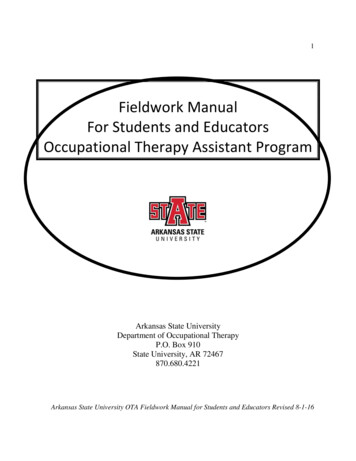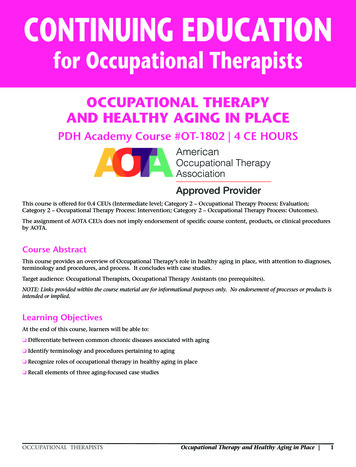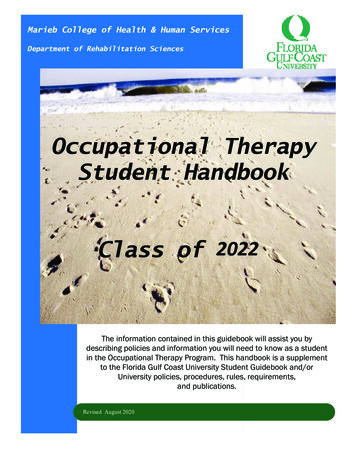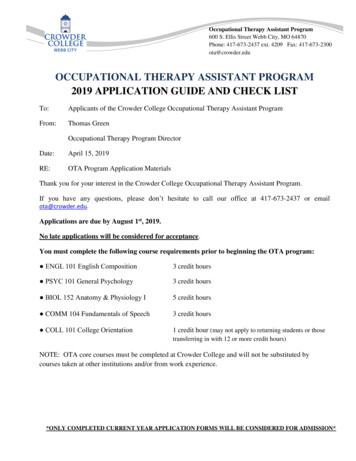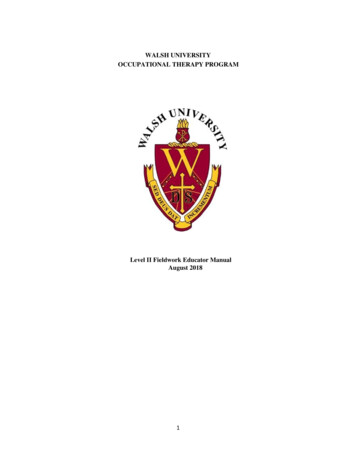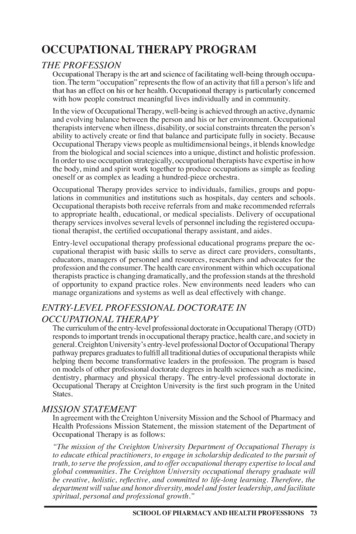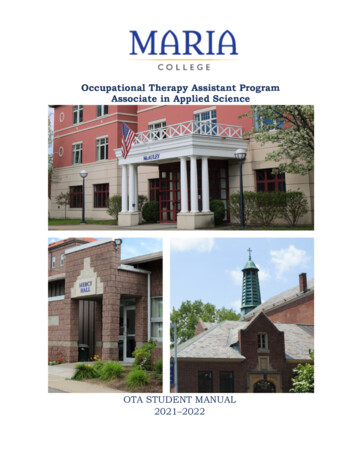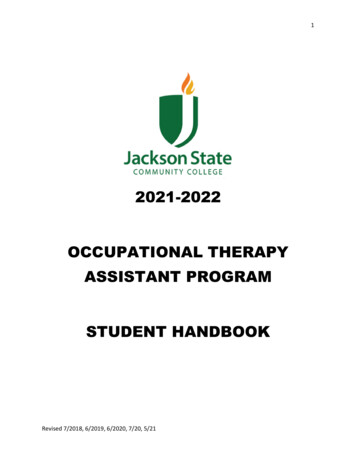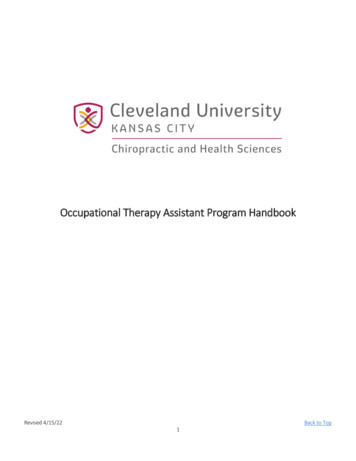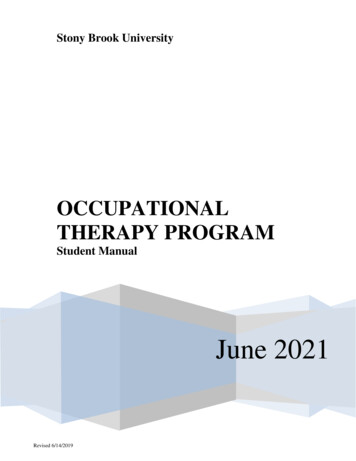
Transcription
Stony Brook UniversityOCCUPATIONALTHERAPY PROGRAMStudent ManualJune 2021Revised 6/14/2019
2ContentsOccupational Therapy Administration, Faculty and Office Staff . 4Full Time Faculty: . 4Administration Staff. 6Additional Administrative Support Members . Error! Bookmark not defined.Adjunct Faculty: . 7School of Health Technology and Management . 8Administration . 8Dean’s Office Staff . 9Philosophical Base and Mission – BSHS/MSOT Program . 10Mission Statement: . 10Progressive Philosophy of Education: . 10Humanist Philosophical Base. 10Course Sequence . 6First Year Graduate . 6Second Year Graduate. 7Third Year Graduate . 7Grading Criteria and Policy . 8Grading policy. 8Program and Classroom Policies . 9Evaluation of Student Learning . 9Course and Instructor Evaluations . 9Attendance . 10Make-Up Exams and Lateness Assignments . 10Progression Policy Requirements . 12Social Networking Guidelines . 12Electronic Devices . 12Dress Code . 12Email and Black Board Accounts . 12Professional Behavior . 13Social Networking . 13Social Events . 13Withdrawal/Leave of Absence . 13Plagiarism . 14Academic Honesty Policy for Distance Education Courses . 14Copyright Materials . 15Recording Classroom Lectures and Activities . 15Confidentiality . 15HIPAA(Health Insurance Portability and Accountability Act) . 16Annual Physical History/Assessment and Immunization Record . 16Student Advisement . 16Student ID’s . 16Graduation Criteria . 17Certification by the NBCOT . 17New York State Licensure . 17Student and Professional Organizations . 18Job Placement/Listings . 19Scholarship Announcements . 19Americans with Disabilities Act . 19Supporting the Occupational Therapy Program . 19Appendix . 20Appendix 1- Curriculum Chart and Credit Hour Information . 21Appendix 2 – OT Curriculum Design . 24Appendix 4 - Faculty Advisor Lists . 26Stony Brook Campus. . .27Southampton Campus . . . .29Appendix 5 - Professional Behavior Monitor. 31Appendix 6 - OT Program Flow Chart . 36Appendix 7 - AOTA OT Code of Ethics and Ethics Standards (2015) . 38
3IntroductionWelcome!!! We hope your experience as a student in the Occupational Therapy program at StonyBrook University will be rewarding. You are embarking on a road that will lead you to a wonderful,fulfilling career.This manual has been created to further introduce you to the Occupational Therapy program. It isimportant that you use this manual in conjunction with the School of Health Technology andManagement Bulletin for 2020-2021 and with the SHTM Student Handbook of Policies andProcedures. Each publication is regularly updated and will be helpful to you in your current and futureclinical and academic endeavors. Please keep the manual, bulletin, and handbook in an easilyaccessible place so that you can refer to each for policy and procedure clarification throughout yourStony Brook University experience.Any information in this manual is subject to change.
4Occupational TherapyFaculty and AdministrationFull Time Faculty: Sean Getty, OTD, OTR/LInterim Chairperson, OT ProgramCoordinator, OT Program SouthamptonClinical Associate Professor(631) 632-5025Sean.Getty@Stonybrook.eduInken Prochilo, MS, OTR/LAcademic Fieldwork CoordinatorClinical Assistant du Ghenet Weldeslassie,PhDClinical Assistant Professor(631) 444-6828Ghenet.Weldeslassie@stonybrook.eduKaren DeChello, OTD, OTR/L, CEAVice Chairperson, OT ProgramClinical Assistant ProfessorCertified Ergonomics du Blanche Leeman, OTR/L, CHTClinical Assistant ProfessorSouthampton CampusBlanche.Leeman@stonybrook.edu Pamela Linden, PhDClinical Associate u Hannah Mercier, PhD, OTR/LAssistant ProfessorHannah.Mercier@stonybrook.eduPart Time Faculty: Dawn Ippolito, MS, OTR/LAssociate Fieldwork CoordinatorClinical Assistant Professor(631) 632-5025Southampton CampusDawn.Ippolito@stonybrook.edu Kyle Karen, MS, OTR/LClinical Assistant ProfessorSouthampton CampusKyle.Karen@stonybrook.edu
6Administration Staff Sarah Battaglia, MAAssistant to the Chair of Occupational TherapyDivision of Rehabilitation duSouthampton Staff Margaret SheryllSouthampton Operations CoordinatorDivision of Rehabilitation SciencesStony Brook Southampton(631) 632-5131Margaret Sheryll@Stonybrook.edu Abigail LuizziAdministrative Assistant(631) 632-2050Abigail.Luizzi@StonyBrook.edu
7Adjunct Faculty: Carol Chamoff, BS, OTR/LClinical Instructor Ginger Johnson, MS, OTR/LClinical Assistant Professor Evan Ludin, MS, OTR/L, CHTClinical Assistant Professor Christopher Marotta, OTR/LClinical Assistant Professor Darlene Piriano, OTR/LClinical Assistant Professor
8School of Health Technology and ManagementAdministration Stacy Jaffee Gropack, PT, PhD, FASAHPDean and Professor, School of Health Technology and ManagementRoom 400(631) 444-2252Stacy.Jaffeegropack@StonyBrook.edu Eric M. Lamberg PT, EdD, CPedAssociate Dean and Professor, School of Health Technology and Management(631) 444-3058Room 419Eric.Lamberg@StonyBrook.edu Karen (Kayla) Mendelsohn (contact re: student issues, financial aid, counseling, etc.)Assistant Dean for Academic and Student Affairs(631) 444-2257Room 404Karen.Mendelsohn@StonyBrook.edu
9Dean’s Office Staff Teresa BlaskopfAcademic and Student Affairs Coordinator(631)-444-2254Room 400Teresa.Balskopf@StonyBrook.edu Taryn LindoOffice Assistant(631)-444-2252Room 400Taryn.Lindo@StonyBrook.edu Jessica Rotolo, MAExecutive Assistant to the Dean(631)-444-6870Room 400Jessica.Rotolo@StonyBrook.edu Angela Scauso, MAPPAdministration and Finance Coordinator(631)-444-6855Room 400Angela.Scauso@StonyBrook.edu
10Philosophical Base and Mission –MSOT ProgramMission Statement:The Stony Brook University Occupational Therapy Program has a five-part mission: Education: To provide comprehensive professional education to meet the demands and needsfor 21st century occupational therapy practice for individuals and communities across the lifespan; Scholarship: To promote research and intellectual endeavors of the highest standards toadvance occupational therapy; Service: To address community, national, and global needs of individuals, families, andpopulations, including being resources to health care and human services organizations,educational institutions, and government public health and social service agencies; Leadership and Advocacy: To promote leadership and advocacy to enable individuals andpopulations to maximally participate in life occupations, access health and human services, andleadership within the occupational therapy profession; Globalization: To advance knowledge and appreciation of diversity and its influence on humanoccupation, health and wellbeing at local, national and international levels.Progressive Philosophy of Education:Purpose of education is to: promote societal well-being enhance an individual’s effectiveness in societyEducation provides learners: with practical knowledge problem solving skillsHumanist Philosophical BasePurpose of education is to: enhance personal growth and development facilitate self-actualizationEducation provides learners:Self –reflection abilities & skillsSelf –directed learning abilities & skillsFaculty believe that an individual’s needs, interests and experiences are key elements in learning; thatpeople have unlimited potential to be developed through education. We believe that it is important forstudents, graduates and faculty to recognize the importance of being motivated and self-directed. Allindividuals must take responsibility for their own learning.The program design stresses the importance of: IndividualityPragmatic knowledgeProblem solving Experiential learningEmpowermentSelf-directedness Lifelong learningDemocratic idealsSocial responsibility
6Course SequenceThe curriculum within the School of Health Technology and Management follows a “Module”system. Each module is approximately five weeks in length. A course may be offered in acombination of modules depending upon the credit assignment. Contact hours and creditallotment are calculated on the Carnegie system. Courses are scheduled within one or moremodules to accurately meet the credit assignment of the course. Please note: ModularSchedules are subject to change and this Course Credit load may also change due tocurriculum redesign. In an effort to provide the best educational experiences certaincourses will be offered in the evenings and/or on weekends. These courses will be taught byexperts in those fields. All students registered for these courses are expected to attend.Carnegie credit hour: Courses are described to be either: lecture courses, courses that have both lecture and labs;independent study, tutorials or seminars. Each of these descriptions represents a certain number of hours thatlearning must be covered. For example, if a course is 3 lecture credits, it means that there are 45 hours of learning(instruction) to be covered. So, one credit of lecture is 15 hours of learning. For every one credit for courses thatare described as lab courses 30 hours of learning must be covered; so if a course is a 2 credit lab course, thelearning must be 60 hours’ worth. The same is true for seminars and tutorials. Independent study courses require 45hours per credit load, so a 2 credit independent study would require 90 hours of instruction.Please see the School of Health Technology and Management bulletin for a description of eachcourse.First Year GraduateCourseTitleCreditsModule(s)HAO 561HAO 504HAO 505HAO523HAO 519HAO 506HAO 573HAO 507HAO 500HAO 586HAO 508HAO 509Functional Anatomy ReviewIntro to Historical & Contemporary Practices of OTFoundations in OTAssessment & Intervention of Psychosocial IssuesKinesiologyGrowth and DevelopmentProf Behaviors IClinical ConditionsFunctional NeuroscienceFieldwork IATheories of Adult RehabilitationPediatrics 3-54-54-65-85-86-86-8
7Second Year GraduateCourseHAO 520HAO 522HAO 587HAO 525HAO 524HAO 526HAO 588HAO 549HAO 527HAO 516HAO 542HAO 574HAO 551HAO 596TitleSubstance AbuseAssessment & Treatment of Adult RehabilitationFieldwork IBVision, Cognition, PerceptionAssessment & Interventions of Upper ExtremitiesGerontologyFieldwork ICIntro to Research DesignSensory IntegrationUniversal DesignPatient EducationProfessional Behaviors IIResearch DesignFW IIACredits 31-32-33-54-54-54-54-56-8Third Year GraduateCourseTitleCredits Module(s)HAO 530HAO 580HAO 597HAO 585Community, Occupational and HealthSpecial TopicsFW IIBDisability and OT42122SummerSummer1-34-5HAO 562HAO 534HAO 593HAO595HAO 570HAO 575Principles of InstructOT ManagerCase StudiesService Learning & Capstone ProjectGlobal Communities Occupation & HealthProfessional Transition3322224-64-65-65-86-86-8
8Grading Criteria and PolicyUnless indicated differently in the course outlines provided by the instructor, the following is thegrading criteria.Minimum deQuality PointsA4A3.67B 3.33B3B2.67C 2.33C2C1.67D 1.33D1.0S Passing (“C” or higher)---F Failure----Students must be in good academic standing (professional GPA 3.0 and overall GPA of 3.0throughout the program. Graduate students must maintain a GPA of 3.0 to be considered in goodstanding.The occupational therapy program offers all courses starting with HAO. The occupationaltherapy program faculty believes that each course offered in the curriculum is essential todeveloping an occupational therapy professional; therefore, all courses within the curriculum areconsidered professional courses.Grading policyIn addition to the School of Health Technology and Management’s academic policies andprocedures, all graduate HAO courses in the Occupational Therapy curriculum must besuccessfully completed with a minimum grade of B, except for first-year science-based courses(Functional Anatomy Review, Kinesiology, and Functional Neuroscience), which require a gradeof B- to pass. Failure to earn a minimum grade in HAO graduate courses will require a studentto repeat the course and prevent the student from participating in clinical affiliations. A studentmay repeat a course only once, inability to successfully pass the course when repeated, mayresult in recommendation for dismissal from the program.Students must also maintain a professional grade point average of 3.0 in the occupational therapygraduate program courses and a 3.0 grade point average in occupational therapy graduateprogram courses. Failure to successfully complete 3 or more courses during the three-yearcurriculum will result in the student being subject to termination from the program.Please refer to SHTM policies on academic standing found in the SHTM Student Handbook.
9Program and Classroom PoliciesEvaluation of Student LearningEvaluation of student learning takes place at several levels -- daily in the classroom, periodicallyas the result of tests and graded assignments, and during fieldwork experiences. It is a keycomponent of teaching and learning. In keeping with the concept that students are individualswith individual styles of learning and communication, faculty is encouraged to use multiplemethods of evaluation throughout the coursework. Occupational Therapy students are evaluatedthrough objective tools and essay tests, multiple choice questions, case studies, lab and practicalwork, written and oral assignments, class presentations, Professional Behavior Monitors andprofessional organization fieldwork evaluation forms during fieldwork experiences.It is the prerogative of the instructor to select the specific method for evaluating learning by thestudent in each course. However, the evaluation methods must be included in the course outline,reviewed and recommended for approval by the School of Health Technology andManagement’s Curriculum Committee and the Dean.The purpose for Fieldwork I and II, the intended learning outcomes, and the faculty, student,clinical fieldwork supervisors’ expectations and responsibilities, as well as the evaluationmethods are reviewed with the students prior to their attending fieldwork. Students have anopportunity to offer feedback about their grading concerns, and their opinions about fieldworksites and their experiences in writing and verbally.Course syllabi are given to and reviewed with the students during the first week of each class.This information includes the methods of evaluation, the weighting of the methods, and criteriafor grading. As an example, if the instructor is employing a mastery learning policy for anassignment, and a “B” is the passing grade, then the students are informed of this by discussionand in the course syllabus.Course and Instructor EvaluationsStudents have the opportunity to complete course and instructor evaluations at the end of eachcourse. Once the evaluations have been rated, they are returned to the Program Director forreview with the faculty. Faculty and the director review the outcomes annually.It is only through such input that growth and change can occur. This evaluation method not onlybenefits you as a student, but it assists the faculty and the program administrators in theirendeavor to provide students with the best program and faculty possible. Students areencouraged to provide constructive feedback to the instructor about the knowledge disseminatedduring the course. Providing constructive feedback is an integral part of being an occupationaltherapist and of professional behaviors.
10AttendancePunctual attendance in all classes is expected of all students. Excessive absences/lateness maybe grounds for recommendation to be dismissed from the program, or for being placed onacademic probation. If a student knows he/she will be absent from class or scheduledactivity, he/she must personally notify the course instructor in advance. Faculty and staffe-mail and phone extensions are listed in this manual. Documentation for absences may berequested, and if requested of the student, the student is under obligation by ProgramPolicy to produce said documentation.If an emergency occurs and the student will not be able to attend class, or if the student is goingto be late due to an emergency, the student must notify the course instructor within 24 hours ofthe scheduled class explaining the absence. Note that it is still the discretion of the courseinstructor to consider it an excused absence. Attendance and participation are expected inevery course. Each student is expected to be on time and remain in class for the full session.Once the lecture or lab activity starts you are considered late. It is your responsibility tonotify the instructor via phone or e-mail prior to the absence/lateness within 24 hours of class.Failure to notify the instructor will result in an unexcused absence [no call or no email, no show].It is not acceptable to have your classmate or another designated person to call or emailyour attendance status to the instructor. The only circumstance where this may beacceptable is in the event you are traveling to class and there is traffic that may delay youarriving on time to class. Every two unexcused absences will result in a decrease in your overallcourse grade by 5 points. Program Policy: Attendance is taken at the beginning of each class.Three lateness will equal one unexcused absence. Every three excused absences may alsoresult in a 5 point decrease in overall course grade (may be considered excessive absences, eventhough they are excused- this is at the discretion of the instructor). Please note that the courseinstructor may have different policy on attendance, in which case, these will be enforced for thatparticular course. Your academic advisor will be informed of absences, lateness and any displayof unprofessional behavior or lack of participation.Stony Brook E-mail account and Blackboard must be checked regularly for classinformation or announcements from the instructor and/or for program changes ornotifications.Make-Up Exams and Lateness AssignmentsPolicies and procedures regarding make up exams (e.g. quizzes, mid- term exams, short exams)are established at the discretion of the individual course instructor. Students are expected tonotify the course instructor at the beginning of the course if the student requires rescheduled timefor a makeup exam. This make up time will follow the policy and procedure of absences andlateness of the program. Students will be required to provide documentation to support theirreasons for requested make up exam time, if the course instructor consents to a makeup exam.There will be no make up for final and practical exams, unless there is a death in the family or anunexpected trauma emergency. In these cases, the student must inform the course instructorwithin 4 hours of the emergency. Documentation of the said emergency will be requested of thestudent, and the student is under obligation by Program Policy to produce said documentation.
11All assignments are to be handed in on or prior to the due date. Five points will be deducted foreach day of lateness, weekends included. All assignments are to be typed and saved on disk/flashdrive in case revisions are necessary.Any assignments done in groups are the responsibility of all group members. Group membersmust sign the final copy to acknowledge equal contribution and an understanding that each groupmember receives the same grade for the final project.Student Grievance Policy and ProceduresHistorically, the university administration, faculty and graduate students have worked togethertoward establishing fair policies and procedures regarding graduate students' rights andresponsibilities. Graduate students, faculty and administrators assume a variety of roles andresponsibilities with respect to one another. Successful graduate education requires fairness andmutual trust in these various roles and responsibilities.Below is the link for the University’s policies and procedures for Graduate Student ut/policy/Grievances Appeals.pdfIf a graduate student feels that she or he has been discriminated against on the basis of any of theabove, that person should refer to the Grievance Procedure for Review of Allegations ofDiscrimination. Contact the University Affirmative Action Office for information anddocumentation of these procedures.We encourage all students to begin resolving grievances first with the faculty member. If thematter cannot be resolved, or the student is uncomfortable with bringing this matter to theattention of the faculty member, then the student is encouraged to present the matter to theprogram chairperson. A resolution of the alleged violation should be sought through a conferenceamong the accused, the accuser, and the graduate program director, if possible. Grievances thatcannot be resolved at the level of the program may be brought to the Dean of the school.
12Progression Policy Requirements in the Occupational Therapy ProgramStudents must be in good academic standing (GPA of 3.0) throughout their three yearsin the program, including receiving a minimum final letter grade of a B for each course.Students who fail a course must satisfactorily repeat the course prior to moving on to the nextcourse. This also includes all Fieldwork Level I and Fieldwork II courses. Failing a coursecould result in a student having to "step out" of the curriculum sequence. If the repeatedcourse is successfully completed, the student will then be able to "step back" into thecurriculum. The need to "step out" and "step back" in could result in a student registering fora modified curriculum plan which could extend the amount of time it takes to complete thecurriculum from the student's initial year of entry.The opportunity to repeat a Fieldwork Level I course because of failure is limited toone time per fieldwork level I course. The opportunity is offered on a case-by-case basis andin accordance with the School of Health Technology and Management's Student Handbook ofPolicies and Procedures (see section on Academic Standing). Failing two consecutivefieldwork level I placements may result in termination from the program. Failure tosuccessfully complete 3 or more courses during the three-year curriculum will result in thestudent being subject to termination from the program.Students must be in good academic standing the semester prior to fieldwork (a GPA
The occupational therapy program offers all courses starting with HAO. The occupational therapy program faculty believes that each course offered in the curriculum is essential to developing an occupational therapy professional; therefore, all courses within the curriculum are considered professional courses.
